In today's fast-paced digital landscape, understanding consumer behavior has become the cornerstone of effective marketing. Traditional methods of consumer research, though valuable, often fail to capture the intricate nuances of human decision-making. This is where the convergence of neuroscience and artificial intelligence (AI) comes into play, offering unprecedented insights into the minds of consumers.
The Intersection of Neuroscience and AI in Marketing
Neuroscience, the study of the nervous system and brain, has long been a field dedicated to understanding how humans think, feel, and behave. When applied to marketing, neuroscience seeks to unravel the psychological triggers that influence consumer decisions. However, the complexity of the human brain poses a significant challenge in translating these insights into actionable marketing strategies.
This is where AI steps in. AI's ability to process vast amounts of data and identify patterns enables marketers to delve deeper into consumer behavior than ever before. By integrating AI with neuroscience, businesses can tap into a wealth of knowledge that reveals the underlying motivations, preferences, and emotional responses of their target audience.
Decoding the Consumer Mind with AI-Powered Neuroscience
At the heart of AI-powered neuroscience in marketing is the ability to decode the consumer mind. Traditional surveys and focus groups can only scratch the surface of consumer intentions. In contrast, AI-driven neuroscience techniques, such as neuroimaging and machine learning algorithms, can analyze real-time brain activity and predict consumer reactions with remarkable accuracy.
For instance, AI can analyze facial expressions, eye movements, and even biometric data to gauge emotional responses to marketing stimuli. These insights are invaluable in understanding what captures attention, what evokes positive or negative emotions, and what drives purchasing decisions. This level of understanding allows marketers to craft campaigns that resonate deeply with their audience, increasing engagement and conversion rates.
Personalization at Scale: The AI Advantage
One of the most significant benefits of integrating AI with neuroscience in marketing is the ability to achieve personalization at scale. Consumers today expect personalized experiences that cater to their individual preferences and needs. AI enables marketers to deliver on this expectation by analyzing vast datasets to identify patterns and trends in consumer behavior.
Through AI, marketers can segment their audience more effectively, tailoring content, offers, and experiences to specific groups or even individuals. This level of personalization goes beyond simple demographic targeting; it delves into the psychological and emotional drivers that influence consumer behavior. As a result, brands can create more relevant and impactful marketing strategies that foster long-term customer loyalty.
Enhancing Customer Engagement Through Emotional Intelligence
Emotional intelligence, the ability to recognize and manage emotions, is a crucial factor in building strong customer relationships. AI-powered neuroscience enhances emotional intelligence in marketing by providing insights into how consumers feel about a brand, product, or campaign. By understanding the emotional impact of marketing efforts, businesses can make data-driven adjustments to their strategies, ensuring that they resonate emotionally with their audience.
For example, AI can analyze sentiment across social media platforms, online reviews, and customer feedback to gauge public perception of a brand. This real-time analysis allows marketers to respond swiftly to negative sentiment or capitalize on positive feedback, enhancing overall customer engagement and satisfaction.
The Future of Marketing: A Symbiosis of AI and Neuroscience
As AI continues to evolve, its integration with neuroscience will further transform the marketing landscape. Future advancements may include more sophisticated AI algorithms that can predict consumer behavior with even greater accuracy, as well as more refined neuroimaging techniques that provide deeper insights into the brain's response to marketing stimuli.
Moreover, as AI and neuroscience become more accessible to businesses of all sizes, the competitive advantage will shift to those who can effectively harness these tools to understand and engage with their audience. The future of marketing lies in the ability to not only reach consumers but to connect with them on a psychological and emotional level—a feat that AI-powered neuroscience is uniquely positioned to achieve.
Conclusion
The marriage of neuroscience and AI represents a new frontier in marketing, offering profound insights into consumer behavior that were once out of reach. By leveraging AI-powered neuroscience, marketers can decode the complex workings of the consumer mind, achieve personalization at scale, and enhance emotional intelligence in their strategies. As this technology continues to advance, it will undoubtedly play a pivotal role in shaping the future of marketing, enabling brands to forge deeper, more meaningful connections with their audience.


